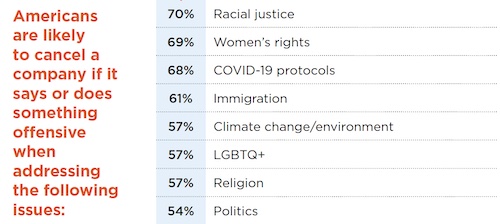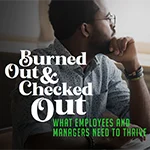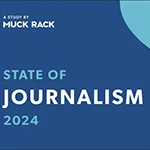 |
With “cancel culture” affecting an increasing number of brands, a new study from Porter Novelli looks at what consumers are trying to achieve when they cancel a brand and at what companies can do to come back from being canceled.
Nearly three-quarters (72 percent) of the 1,004 consumers that PN polled in December said they feel “more empowered than ever before” to share their opinions about a company’s actions, leadership or spokespeople.
Almost as many (64 percent) think that social media has provided them with a voice that they can use to influence companies.
The quality of a brand’s products or services does not protect it from being canceled, the study finds. Two-thirds (66 percent) of survey respondents said that if a company does something wrong or offensive, they would cancel it despite loving its products.
Issues surrounding racial justice were the top reason (70 percent) respondents gave for why they would cancel a company. Other hot-button topics include women’s rights (69 percent), COVID-19 protocols (68 percent) and immigration (61 percent). Surprisingly, politics (54 percent) was further down the list.
 |
Regarding the outcome that consumers hope their cancellation of a company will have, the goal cited the most often is that the company would “change its ways” (38 percent). More than a quarter (27 percent) want to see the canceled company “change policies/stances surrounding political involvement.”
A significant number are also looking for such immediate company actions as firing the person responsible for an offensive statement (26 percent) or dissociating itself from a celebrity or spokesperson who said or did something offensive (22 percent).
Only 14 percent said that their aim was for the canceled company to “go away” completely.
Also, despite the continuing growth of cancel culture, more than half of respondents (56 percent) said they had refrained from participating in the practice.
For companies trying to bounce back from being canceled, the survey respondents had a few suggestions. Making a public statement of apology (43 percent) was the top strategy named, with clarifying the situation (41 percent) coming close behind.
Firing the person responsible for the offensive statement or policy showed up on this list as well, with 33 percent saying it could help a company be “uncancelled.” Just 17 percent thought that making a donation to an associated nonprofit would do any good.
“In the eyes of many Americans, they see cancellations as a way to share their voice—and disapproval—with companies so that change can be made,” the study’s authors say. They also note that companies that actively engage in the dialogue surrounding a cancellation “tend to fare better in creating a positive discourse once again.”
To see the complete study, click here.


 Consumers who once demanded convenience now require consistent, multi-channel experiences that cater to them at every point. Brands must have a clear, audience-appropriate, and channel-specific voice across all platforms.
Consumers who once demanded convenience now require consistent, multi-channel experiences that cater to them at every point. Brands must have a clear, audience-appropriate, and channel-specific voice across all platforms. Employees at U.S. companies are experiencing high levels of burnout, but managers are lagging behind when it comes to their awareness of the problem
Employees at U.S. companies are experiencing high levels of burnout, but managers are lagging behind when it comes to their awareness of the problem Brand has a powerful effect on a company’s valuation, but the level of brand understanding in the investment community leaves a lot to be desired, according to a new study from Brodeur Partners, Interbrand and NewtonX.
Brand has a powerful effect on a company’s valuation, but the level of brand understanding in the investment community leaves a lot to be desired, according to a new study from Brodeur Partners, Interbrand and NewtonX. AI may still be viewed with a wary eye by most media pros, but its use is growing, according to a new study from Muck Rack.
AI may still be viewed with a wary eye by most media pros, but its use is growing, according to a new study from Muck Rack. A new study from Walker Sands says that some marketers have been putting the cart before the horse when it comes to the relationship between marketing channels and business outcomes.
A new study from Walker Sands says that some marketers have been putting the cart before the horse when it comes to the relationship between marketing channels and business outcomes.


 Have a comment? Send it to
Have a comment? Send it to 
Jan. 28, 2021, by Joe Honick
If these findings are true, they also reflect a major reversal of public reaction to most of the same big brands in categories existing before Pearl Harbor. In those days, most of America's best known companies, from manufacturing to finance and service, were happily and profitably ensconced with the Axis countries, especially Nazi Germany and only "pivoted" after December 7, 1941, though not all of them actually did shift.
What is really significant is how effectively the same corporate behemoths have managed to erase those realities.